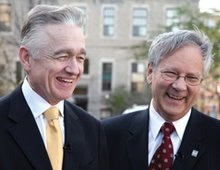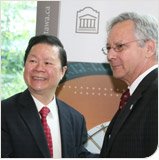
Today (December 6, 2007) campus democracy has attained new heights at the University of Ottawa.
Two community members were arrested and all community members and all non-Faculty of Science students were barred from attending a normally public Faculty of Science Council meeting so that certain agenda items would not be discussed.
The dean of the Faculty of Science, André E. Lalonde, has used a process technicality to motion offensive agenda items off the agenda. This Code Morin technicality, which allows a vote without discussion, is traditionally reserved to remove insignificant agenda items.
One agenda item in question, to create a second-year activism course, was significant enough for 300 students to sign a petition in its support, for the university to use City of Ottawa police “services” to arrest community members on bogus trespassing charges, and for all Faculty Council meetings in the last year to be cancelled over it.
Such is the twisted logic of a dean’s understanding of democracy and collegiality, at a university that, in its Vision 2010 mission statement, calls for increased community participation in its governance, and at which its president celebrates the importance of activism in his letters to community members condemning the cancellation of the popular first-year activism course.
So the dean has cancelled a fourth Faculty Council meeting in a row. As a result, there has not been a regular Faculty Council meeting in over one year and academic program development has come to a stand still.
A short history of cancelled meetings…
> April 5, 2007: Dean cancels meeting because student Council member Severin Stojanovic persistently complaints about dean’s illegitimate veto of his agenda item to consider approval of a second-year activism course. Meeting lasts 20 minutes.
> May 22, 2007: Dean cancels meeting because community member and independent reporter Karen Dawe refuses to stop video taping the proceedings. Meeting lasts 5 minutes. (Dawe was arrested by City of Ottawa police today, outside the Council meeting room.)
Stojanovic spearheads a campaign to have the Faculty By-Laws respected by the dean. VP-Academic, Robert Major, intervenes twice to claim that dean’s veto is legitimate. Administrative Committee claims that it has no power to force the dean to follow Faculty bylaws in running Council meetings.
> November 6, 2007: Dean cancels meeting after Stojanovic complains that proper process was not followed, that would allow new agenda items to be proposed. Meeting lasts 0 minutes.
Community member Jane Scharf legally submits an agenda item to discuss adding five community member representatives to the 40 or so member Faculty Council. The item is refuted without valid reason. (Scharf was arrested by City of Ottawa police today, outside the Council meeting room.)
New student Faculty Council member Daniel Cayley-Daoust submits an agenda item to discuss why the first-year activism course was not offered in the fall 2007 term.
> December 6, 2007: Dean has now added Stojanovic’s agenda item but the item is immediately motioned off the agenda as meeting begins. Stojanovic objects. Dean cancels meeting after Stojanovic refuses to leave the room. Meeting lasts 15 minutes.
Physics professor Denis Rancourt was to present the activism course item to Council and objected to this “dirty trick” being used to filter out unwanted agenda items (while being surprised that it took the dean eight months to decide to use a Code Morin procedural tactic to his ends rather than blatantly ignore the Faculty By-Laws). The dean would not let Rancourt make his point about misuse of the Code and instead asked Rancourt to leave. Rancourt used his academic collegial right to stay and make his point.
.
.
***
.
As the 2010 of Vision 2010 approaches at Canada’s university, we must wonder what the next Faculty Council meeting has in store for us. It does not look promising, as none of the tenured professor Council members saw anything anomalous in illegitimately invoking a Code Morin technicality to remove rather than discuss student and community supported agenda items…
Yet another milestone in applied democracy at the U of O!
.
[Photo credit: University of Ottawa]
.
RELATED AND FOLLOW UP:




1 comment:
http://web5.uottawa.ca/vision2010/pdf/strategic_plan.pdf
(1)
"A university that builds strong partnerships to fulfill its social responsibilities
We strengthen our programs and perform our social, political and community-outreach roles thanks to productive ties with other institutions of higher learning, government agencies, social and community associations, research councils, the private sector, embassies, and national and international organizations."
(2)
"A university that values its community
We encourage freedom of expression in an atmosphere of open dialogue, enabling critical thought, supported by intellectual integrity and ethical judgment. Collegiality, transparency and accountability are the principles that guide our university governance."
(3)
"Relations with the local community: Launch initiatives to strengthen relations with our community."
(4)
"To ensure that community members take a more active part in the decision making process and are promptly informed of decisions affecting our future."
4/4!
Post a Comment